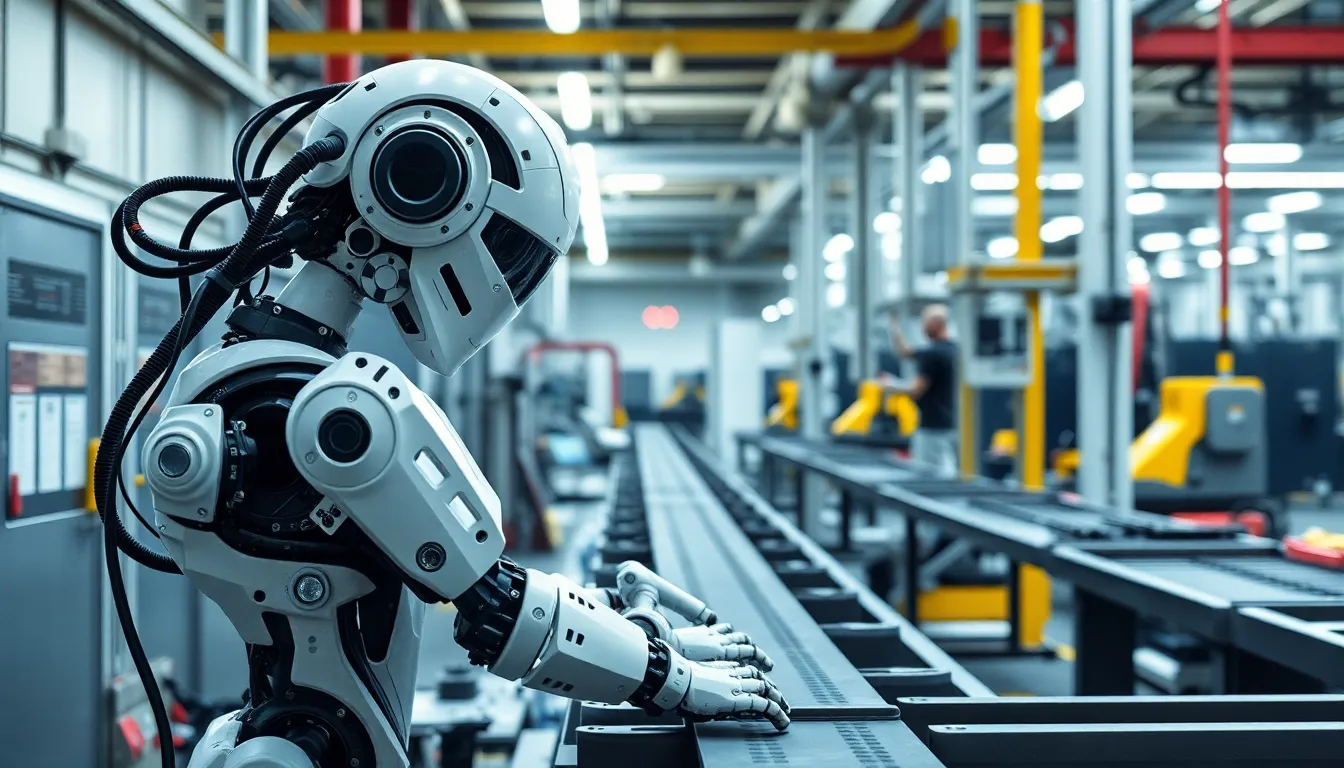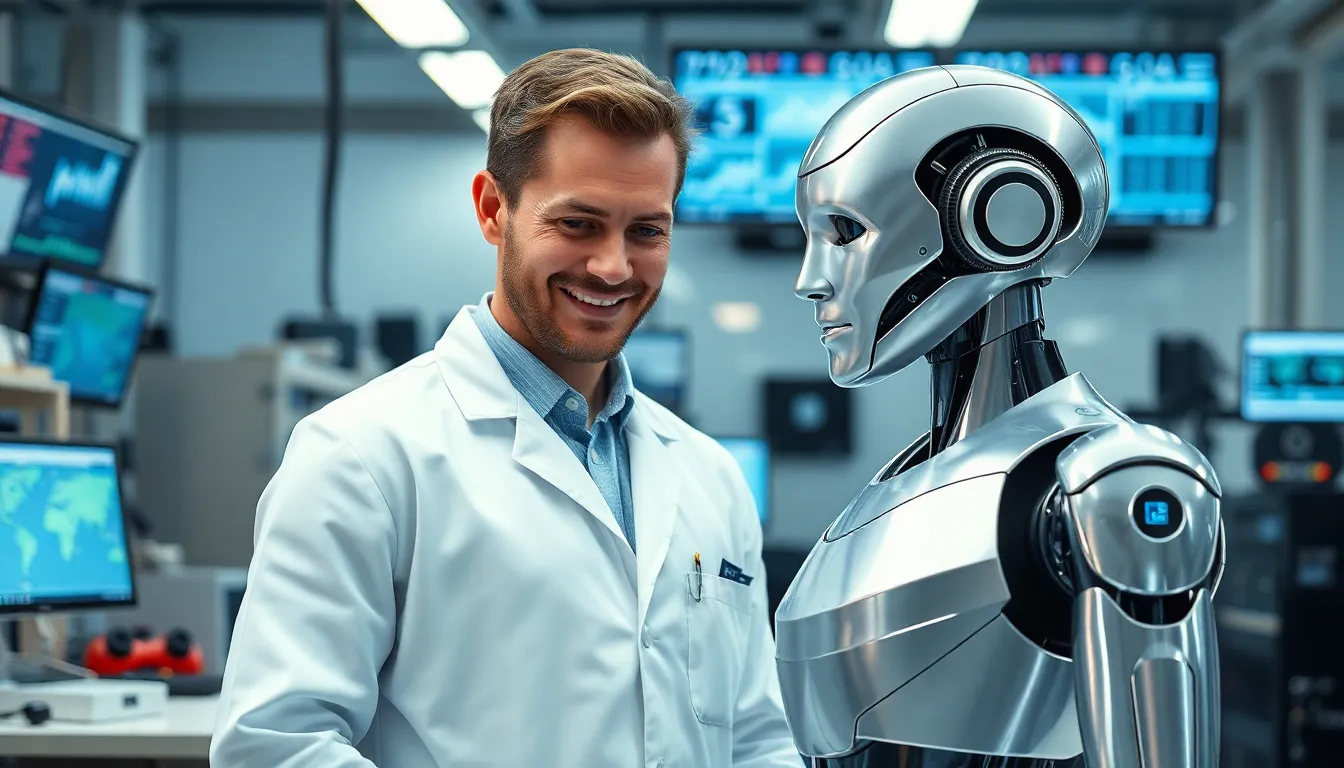In a world increasingly driven by technology, intelligent machines are reshaping how people live and work. From self-driving cars to smart assistants, these advanced systems are not just tools; they’re becoming integral parts of daily life. As they learn and adapt, the potential for intelligent machines to enhance productivity and improve decision-making is immense.
The rise of artificial intelligence has sparked a revolution, pushing the boundaries of what machines can achieve. With capabilities that mimic human cognition, these devices are transforming industries, driving innovation, and raising important questions about ethics and the future of work. Understanding intelligent machines is crucial for navigating this rapidly evolving landscape.
Table of Contents
ToggleOverview of Intelligent Machines
Intelligent machines encompass a broad range of technologies designed to perform tasks that typically require human intelligence. These systems integrate advanced algorithms and data processing capabilities to interpret, learn, and respond to various inputs. Machine learning, a subset of artificial intelligence, plays a crucial role in enhancing their ability to identify patterns and make predictions based on historical data.
Key Characteristics
- Autonomy: Intelligent machines operate independently, making decisions without human intervention in real-time scenarios.
- Adaptability: These machines adjust to new information and environments, optimizing their performance as conditions change.
- Learning Capability: They utilize machine learning techniques to analyze data, allowing continuous improvement in tasks and functions.
Applications in Various Industries
Intelligent machines find application across multiple sectors, including:
- Healthcare: Utilization of AI-driven diagnostics, robotic surgery, and personalized treatment plans.
- Manufacturing: Deployment of automated assembly lines, predictive maintenance, and quality control systems.
- Finance: Implementation of algorithmic trading, fraud detection, and customer service chatbots.
Ethical Considerations
The integration of intelligent machines raises significant ethical questions. Issues related to privacy, job displacement, and decision-making transparency demand careful consideration. Organizations must establish frameworks to address these concerns, ensuring responsible deployment and use of technology.
Understanding the structure and functionality of intelligent machines equips individuals and organizations to navigate the evolving landscape of work and innovation effectively.
Types of Intelligent Machines

Intelligent machines come in various forms, each with unique capabilities and applications. Understanding these types aids in recognizing their influence across different sectors.
Robotics
Robotics includes machines designed for tasks requiring precision, strength, and automation. Applications span from industrial robots performing assembly line functions to service robots assisting in healthcare. Notable types include:
- Industrial Robots: Used in manufacturing for repetitive tasks like welding and painting.
- Service Robots: Deployed in healthcare settings for patient assistance or surgical procedures.
- Humanoid Robots: Engineered to replicate human interaction, often used in research or customer service.
Machine Learning Systems
Machine learning systems leverage algorithms to analyze data and improve operations over time. They recognize patterns and make predictions based on historical data, significantly impacting various fields. Key components include:
- Supervised Learning: Trains models on labeled datasets to forecast outcomes.
- Unsupervised Learning: Identifies hidden patterns in data without predefined labels.
- Reinforcement Learning: Utilizes feedback from actions to optimize decision-making processes.
Natural Language Processing
- Text Analysis: Extracts relevant information from written content, streamlining data processing.
- Speech Recognition: Converts spoken language into text for improved human-machine interaction.
- Sentiment Analysis: Evaluates user sentiment towards products or services, aiding in customer feedback systems.
Applications of Intelligent Machines
Intelligent machines play a critical role across various industries, driving efficiency and transforming traditional processes. Their applications in healthcare, manufacturing, and transportation illustrate their versatility and impact.
Healthcare
Intelligent machines enhance healthcare through advanced diagnostics, personalized treatment, and robotic assistance. These systems analyze medical data to identify patterns, enabling earlier detection of diseases. For instance, AI-driven algorithms assist radiologists in interpreting medical imaging, significantly improving accuracy. Robotics in surgery allows for precision and minimally invasive procedures, resulting in faster recovery times for patients. Additionally, AI applications in patient monitoring ensure continuous observation, alerting medical staff to potential concerns promptly.
Manufacturing
In manufacturing, intelligent machines streamline operations and boost productivity. Automation technologies, including robotic arms and assembly line robots, perform repetitive tasks with high precision, reducing human error. Predictive maintenance systems analyze equipment performance data to foresee failures, minimizing downtime. Smart manufacturing integrates IoT devices to create interconnected systems that optimize resource use and improve supply chain management. These advancements allow manufacturers to respond more quickly to market demands and enhance overall efficiency.
Transportation
Intelligent machines revolutionize transportation through automation and enhanced safety features. Autonomous vehicles utilize AI and sensors to navigate environments, significantly reducing the risk of accidents caused by human error. Traffic management systems leverage real-time data to optimize traffic flow and reduce congestion, leading to shorter travel times. Industrial applications, such as automated logistics, employ intelligent machines to facilitate efficient warehouse operations and delivery management. These developments contribute to safer, more efficient transportation systems.
Challenges in Developing Intelligent Machines
Developing intelligent machines presents significant challenges that must be addressed to ensure successful integration into society. Key obstacles include ethical considerations and technical limitations.
Ethical Considerations
Ethical considerations play a crucial role in the development of intelligent machines. Concerns arise around privacy, as these systems often require access to personal data for optimization and learning. Additionally, algorithmic bias can lead to unfair decision-making in critical areas like hiring and law enforcement. Developers must ensure transparency in machine decision-making processes to build trust with users. Moreover, the displacement of jobs due to automation raises important societal questions about workforce realignment and the potential widening of economic inequality.
Technical Limitations
Technical limitations significantly impact the development of intelligent machines. Current algorithms might struggle with understanding context or nuance, which can lead to misinterpretations in natural language processing tasks. Furthermore, data quality and availability can constrain machine learning effectiveness, as systems depend heavily on large, diverse datasets for accurate training. Scalability also poses a challenge; as the complexity of tasks increases, the computational resources required can become substantial. Ultimately, creating robust and reliable intelligent machines necessitates overcoming these technical hurdles.
The Future of Intelligent Machines
The future of intelligent machines promises significant advancements that could reshape various aspects of life and work. Innovations in artificial intelligence will enhance the ability of these machines to analyze vast amounts of data, leading to more informed decisions across industries. For instance, predictive analytics will enable businesses to anticipate market trends and customer needs, fostering proactive strategies.
Robotics will continue evolving, integrating sophisticated sensors and AI algorithms, allowing machines to work harmoniously alongside humans. In healthcare, robotic surgery and patient monitoring systems will increase precision and efficiency, improving outcomes for numerous medical procedures.
Machine learning will see accelerated growth, refining algorithms for better data processing. By employing deep learning techniques, intelligent machines will enhance pattern recognition, further improving predictions in sectors such as finance and supply chain management.
Natural language processing technology will advance, enabling machines to achieve higher levels of comprehension and engagement with human users. The ongoing refinement of voice recognition systems will lead to seamless communication between intelligent machines and people, enhancing customer service and user experiences.
Ethical considerations will remain crucial as intelligent machines become more integrated into society. Developing frameworks that ensure equitable access, address algorithmic bias, and prioritize user privacy is vital for maintaining public trust in these technologies. Transparency in decision-making processes will be increasingly necessary to foster accountability and encourage acceptance.
The collaboration between humans and intelligent machines will extend into new realms, promoting growth in fields like education, agriculture, and environmental conservation. By leveraging data-driven insights, these machines will aid in better resource management and support sustainable practices.
Investment in research and development will play a key role in driving the evolution of intelligent machines. As organizations recognize their potential, increased funding will facilitate breakthroughs that enhance capabilities and applications.
Through ongoing innovation and responsible development, intelligent machines are set to revolutionize industries, improve quality of life, and pave the way for a more interconnected world.
Intelligent machines are reshaping the fabric of society and the workplace. Their ability to learn and adapt makes them invaluable partners in driving efficiency and innovation across diverse sectors. As these technologies continue to evolve, the collaboration between humans and machines will likely deepen, unlocking new potential in fields like education and environmental conservation.
However, navigating the ethical implications and ensuring equitable access remains paramount. The future will demand a careful balance between harnessing the power of intelligent machines and addressing the challenges they present. Embracing this journey will be crucial for fostering a more connected and prosperous world.




